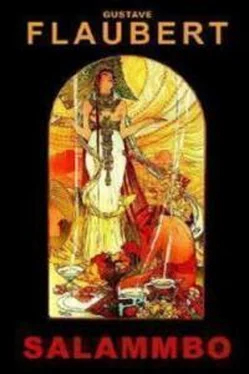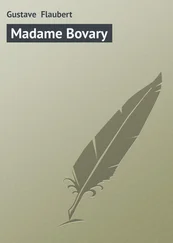Then he censured the wrongs done to the Republic, and to the Barbarians; the fault lay with a few mutineers who had alarmed Carthage by their violence. The best proof of good intention on the part of the latter was that it was he, the eternal adversary of the Suffet Hanno, who was sent to them. They must not credit the people with the folly of desiring to provoke brave men, nor with ingratitude enough not to recognise their services; and Gisco began to pay the soldiers, commencing with the Libyans. As they had declared that the lists were untruthful, he made no use of them.
They defiled before him according to nationality, opening their fingers to show the number of their years of service; they were marked in succession with green paint on the left arm; the scribes dipped into the yawning coffer, while others made holes with a style on a sheet of lead.
A man passed walking heavily like an ox.
"Come up beside me," said the Suffet, suspecting some fraud; "how many years have you served?"
"Twelve," replied the Libyan.
Gisco slipped his fingers under his chin, for the chin–piece of the helmet used in course of time to occasion two callosities there; these were called carobs, and "to have the carobs" was an expression used to denote a veteran.
"Thief!" exclaimed the Suffet, "your shoulders ought to have what your face lacks!" and tearing off his tunic he laid bare is back which was covered with a bleeding scab; he was a labourer from Hippo–Zarytus. Hootings were raised, and he was decapitated.
As soon as night fell, Spendius went and roused the Libyans, and said to them:
"When the Ligurians, Greeks, Balearians, and men of Italy are paid, they will return. But as for you, you will remain in Africa, scattered through your tribes, and without any means of defence! It will be then that the Republic will take its revenge! Mistrust the journey! Are you going to believe everything that is said? Both the Suffets are agreed, and this one is imposing on you! Remember the Island of Bones, and Xanthippus, whom they sent back to Sparta in a rotten galley!"
"How are we to proceed?" they asked.
"Reflect!" said Spendius.
The two following days were spent in paying the men of Magdala, Leptis, and Hecatompylos; Spendius went about among the Gauls.
"They are paying off the Libyans, and then they will discharge the Greeks, the Balearians, the Asiatics and all the rest! But you, who are few in number, will receive nothing! You will see your native lands no more! You will have no ships, and they will kill you to save your food!"
The Gauls came to the Suffet. Autaritus, he whom he had wounded at Hamilcar's palace, put questions to him, but was repelled by the slaves, and disappeared swearing he would be revenged.
The demands and complaints multiplied. The most obstinate penetrated at night into the Suffet's tent; they took his hands and sought to move him by making him feel their toothless mouths, their wasted arms, and the scars of their wounds. Those who had not yet been paid were growing angry, those who had received the money demanded more for their horses; and vagabonds and outlaws assumed soldiers' arms and declared that they were being forgotten. Every minute there arrived whirlwinds of men, as it were; the tents strained and fell; the multitude, thick pressed between the ramparts of the camp, swayed with loud shouts from the gates to the centre. When the tumult grew excessively violent Gisco would rest one elbow on his ivory sceptre and stand motionless looking at the sea with his fingers buried in his beard.
Matho frequently went off to speak with Spendius; then he would again place himself in front of the Suffet, and Gisco could feel his eyes continually like two flaming phalaricas darted against him. Several times they hurled reproaches at each other over the heads of the crowd, but without making themselves heard. The distribution, meanwhile, continued, and the Suffet found expedients to remove every obstacle.
The Greeks tried to quibble about differences in currency, but he furnished them with such explanations that they retired without a murmur. The Negroes demanded white shells such as are used for trading in the interior of Africa, but when he offered to send to Carthage for them they accepted money like the rest.
But the Balearians had been promised something better, namely, women. The Suffet replied that a whole caravan of maidens was expected for them, but the journey was long and would require six moons more. When they were fat and well rubbed with benjamin they should be sent in ships to the ports of the Balearians.
Suddenly Zarxas, now handsome and vigorous, leaped like a mountebank upon the shoulders of his friends and cried:
"Have you reserved any of them for the corpses?" at the same time pointing to the gate of Khamon in Carthage.
The brass plates with which it was furnished from top to bottom shone in the sun's latest fires, and the Barbarians believed that they could discern on it a trail of blood. Every time that Gisco wished to speak their shouts began again. At last he descended with measured steps, and shut himself up in his tent.
When he left it at sunrise his interpreters, who used to sleep outside, did not stir; they lay on their backs with their eyes fixed, their tongues between their teeth, and their faces of a bluish colour. White mucus flowed from their nostrils, and their limbs were stiff, as if they had all been frozen by the cold during the night. Each had a little noose of rushes round his neck.
From that time onward the rebellion was unchecked. The murder of the Balearians which had been recalled by Zarxas strengthened the distrust inspired by Spendius. They imagined that the Republic was always trying to deceive them. An end must be put to it! The interpreters should be dispensed with! Zarxas sang war songs with a sling around his head; Autaritus brandished his great sword; Spendius whispered a word to one or gave a dagger to another. The boldest endeavoured to pay themselves, while those who were less frenzied wished to have the distribution continued. No one now relinquished his arms, and the anger of all combined into a tumultuous hatred of Gisco.
Some got up beside him. So long as they vociferated abuse they were listened to with patience; but if they tried to utter the least word in his behalf they were immediately stoned, or their heads were cut off by a sabre–stroke from behind. The heap of knapsacks was redder than an altar.
They became terrible after their meal and when they had drunk wine! This was an enjoyment forbidden in the Punic armies under pain of death, and they raised their cups in the direction of Carthage in derision of its discipline. Then they returned to the slaves of the exchequer and again began to kill. The word "strike," though different in each language, was understood by all.
Gisco was well aware that he was being abandoned by his country; but in spite of its ingratitude he would not dishonour it. When they reminded him that they had been promised ships, he swore by Moloch to provide them himself at his own expense, and pulling off his necklace of blue stones he threw it into the crowd as the pledge of his oath.
Then the Africans claimed the corn in accordance with the engagements made by the Great Council. Gisco spread out the accounts of the Syssitia traced in violet pigment on sheep skins; and read out all that had entered Carthage month by month and day by day.
Suddenly he stopped with gaping eyes, as if he had just discovered his sentence of death among the figures.
The Ancients had, in fact, fraudulently reduced them, and the corn sold during the most calamitous period of the war was set down at so low a rate that, blindness apart, it was impossible to believe it.
"Speak!" they shouted. "Louder! Ah! he is trying to lie, the coward! Don't trust him."
Читать дальше









![Гюстав Флобер - Закат Карфагена [Сборник]](/books/414440/gyustav-flober-zakat-karfagena-sbornik-thumb.webp)
